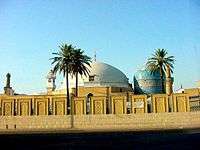Sayyid Ali Akbar
| Sayyid Ali Akbar | |
|---|---|
| Born | 869-874 |
| Died | ? |
| Other names | Ali Akbar Ibn Hasan Ibn Ali Ibn Muhammad |
| Title |
Sayyid ul Sadaat(leader of the sayyids) Imamzadeh(son of the Imam) Najm Ahlul Bayt Rasul Allah(Star of the Household of the Prophet of Allah) |
| Religion | Islam |
| Children | Sayyid Mahmud, Sayyid Muhammad |
| Parent(s) | Imam Hasan al Askari |
| Relatives | Muhammad al-Mahdi(brother) |
| Part of a series on |
| Islam |
|---|
 |
|
Related topics |
|
Sayyid Ali Akbar was an Islamic saint, son of Imam Hasan al Askari and brother of the Twelver Imam Muhammad al Mahdi. His existence is disputed and rejected by Shiite historians. The fact why his existence was hidden, was because of the contemporary political conflicts between the divinely appointed Imamah of his father and brother and the feudal leadership of the Abbasids.[1][2][3][4][5]
Lineage
- 1 Muhammad
- 2 Ali ibn Abi Talib and Fatima Al Zahra
- 3 Imam Hussain
- 4 Imam Ali Zayn al-Abidin
- 5 Imam Muhammad al Baqir
- 6 Imam Ja'far al-Sadiq
- 7 Imam Musa al Kazim
- 8 Imam Ali al Reza
- 9 Imam Muhammad al Taqi
- 10 Imam Ali al Hadi
- 11 Imam Hasan al Askari
- 12 Sayyid Mir Ali Akbar
Son of Imam Hasan al Askari
Genealogy trees of middle eastern families, mostly from Persia and Khorasan show that Imam Hasan al-Askari had also a second son called Sayyid Ali Akbar. It definitely indicates that Imam al-Askari had children and it also substantiates the existence of Imam Muhammad al Mahdi. The reason, why the fact that Imam Al Askari had children or not is till today disputed was maybe because of the political conflicts between the followers of the Imamah and the leadership of the Abbasids and Ghulat Shiites who had not believed in Imam Hasan al-Askaris Imamah. Another reason was the protection against Imam Hasan al Askaris brother Jafar who pretended to be the Imam after his brother violently and denunciated, therefore, Hudaith Khatun.[6] Another part of historians studying the pedigrees of some Central Asian saints "shejere" (genealogy trees), believe that the 12th Imam was not the only son of Imam Hasan al-Askari. In fact, the 11th Imam had two sons, Sayyid Muhammad (i.e. Imam Mahdi) and Sayyid Ali Akbar. Notable descendants of Sayyid Ali Akbar are Sufi Saints like Maudood Chishti and Bahauddin Naqshband.,[7][8][9][10] descendant after 11 generations. Khwaja Khawand Mahmud known as Hazrat Ishaan, descendant after 18 generations and the three saintly brothers Sayyid ul Sadaat Sayyid Mir Jan Sayyid ul Sadaat Sayyid Mahmud Agha and Sayyid ul Sadaat Sayyid Mir Fazlullah, Qadhi ul Qudhad i.e. chief of justice of the Emirate of Afghanistan, maternal descendants of Imam Hasan al Askari and Hazrat Ishaan.[11] Also qadi Qozi Sayyid Bahodirxon,[12][13] and the Sufi saints Tajuddin Muhammad Badruddin [14] and Pir Baba [15] and Sayyid Ahmed Amiruddin.[16][17]Another descendant of Sayyid Ali Akbar was Saint Ishan (Eshon) Imlo of Bukhara.[18] Ishan Imlo Bukhara "saint of the last time," as he is called in Bukhara, as it is believed that after him the Saints had no more. The average Asian Muslims revere him as the last of the Saints. Ishan Imlo according to the source, died in 1162 AH (1748–1749), the mausoleum (Mazar) is in a cemetery in Bukhara.
According to the reports, Imam Hasan al-Askari [as] had more than one concubine and also had maids [Malak-ul-Yameen] with he is believed to have had relations. The family of the venerable Khwaja Baha al-Din descends from ‘Ali ibn Abu Muhammad Hasan ibn ‘Ali, a separate line from that of the illustrious Imam Muhammad ibn Hasan al-Muntadhar [as]. While many Ulema in Ahlus Sunnah generally deny the existence of any children of Imam Hasan ibn ‘Ali al-Askari [as], including the Mahdi [as], those amongst the Sufis who do believe he had a son believe Khwaja Baha al-Din Shah Naqshband, Khwaja Qubt al-Din Mawdud (according to the elders of the Chishtiyya, as he founded the Chishtiyya order) and Sayyid Ahmad Badawi of Egypt all descend from Imam Abu Muhammad Hasan ibn ‘Ali al-Askari Thani [as]. While the Shiites in general deny this, ironically, the only textual evidence to support this Sufi claim comes from a narration found in the Shiite hadith book al-Kafi. According to al-Kafi, in his Usool, in the chapter of the Birth of Abi Muhammad al-Hasan ibn ‘Ali: “When Abi Muhammad al-Hasan ibn ‘Ali became ill…the Sultan…called certain women with knowledge to deal with pregnancy. They examined his (Abi Muhammad al-Hasan ibn ‘Ali [as]) ladies. A certain woman had said one of the ladies is pregnant. She was accommodated in a certain quarter… When the pregnancy was proved invalid, they distributed his legacy between his mother and brother” [al-Kafi, by Muhammad Ya’qub Kulayni. Translated by Muhammad Sarwar. Chap. 124, Birth of Abi Muhammad al-Hasan ibn ‘Ali, p.705]. This narration of the Shiites establishes that Imam Hasan al-Askari [rad] had more than one concubine and multiple maids with whom he had relations, and through whom he could have had progeny other than Sahib uz-Zaman Imam Abul Qasim Muhammad al-Muntadhar al-Mahdi [as] as the Sufis claim.
In her book "Pain and Grace: A Study of Two Mystical Writers of Eighteenth-Century Muslim India" p. 32, Dr.Annemarie Schimmel writes:
"Khwaja Mir Dard`s family, like many nobles, from Bukhara; led their pedigree back to Baha'uddin Naqshband, after whom the Naqshbandi order is named, and who was a descendent, in the 11th generation of the 11th Shia imam al-Hasan al-Askari."
Although Shiite historians generally reject the claim Hasan al-Askari fathered children other than Muhammad al-Mahdi, the Shiite hadith book Usul al-Kafi, in Bab Mawlid Abi Muhammad al-Hasan b. 'Ali confirms the claim that Hasan al-Askari had more than one wife, in addition to slave girls, with whom he had relations. In his Usul, al-Kafi writes:
"When the caliph got news of Imam Hasan 'Askari's illness, he instructed his agents to keep a constant watch over the house of the Imam...he sent some of these midwives to examine the slave girls of the Imam to determine if they were pregnant. If a woman was found pregnant she was detained and imprisoned...".
Notable descendants
- Bahauddin Naqshband
- Khwaja Khawand Mahmud known as Hazrat Ishaan
- Sayyid ul Sadaat Sayyid Mir Jan
- Sayyid ul Sadaat Sayyid Mahmud Agha
- Ishan Imlo
- Tajuddin Muhammad Badruddin
- Pir Baba
- Qozi Sayyid Bahodirxon
- Sayyid Ahmed Amiruddin
See also
- Muhammad
- Ali ibn Abi Talib
- Twelve Imams
- Imam Hasan al Askari
- Imam Muhammad al Mahdi
- Narjis Khatun
- Ahlul Bayt
- Bahauddin Naqshband
- Hazrat Ishaan
- Sayyid Mir Jan
- Abbasid Caliphate
References
- ↑ Tazkare Khwanadane Hazrat Eshan (genealogy of the family of Hazrat Eshan)(by author and investigator:Muhammad Yasin Qasvari Naqshbandi company: Edara Talimat Naqshbandiyya Lahore) p.63
- ↑ al-Kafi, by Muhammad Ya'qub Kulayni. Translated by Muhammad Sarwar. Chap. 124, Birth of Abi Muhammad al-Hasan ibn 'Ali, p.705
- ↑ Dr.Annemarie Schimmels book "Pain and Grace: A Study of Two Mystical Writers of Eighteenth-Century Muslim India" BRILL, 1976, p.32
- ↑ ZiaIslamic "Gulzar auliya"
- ↑ Frederic P. Miller, Agnes F. Vandome, John McBrewster "Baha-ud-Din Naqshband Bukhari" 2011, ISBN 978-6-1341-5642-4
- ↑ Modarressi: Crisis and Consolidation. 1993, p. 78.
- ↑ Darood E Pak Ki Fazeelat
- ↑ Baha-ud-Din Naqshband (R.A)
- ↑ [Frederic P. Miller, Agnes F. Vandome, John McBrewster «Baha-ud-Din Naqshband Bukhari» 2011, ISBN 978-6-1341-5642-4]
- ↑ Род Бахауддина Накшбанда
- ↑ Tazkare Khwanadane Hazrat Eshan (genealogy of the family of Hazrat Eshan)(by author and investigator: Muhammad Yasin Qasvari Naqshbandi company:Edara Talimat Naqshbandiyya Lahore)
- ↑ "Ishtixonning so'nggi qozisi Qozi Sayyid Bahodirxon -". Türkistan Seyyidler ve Şerifler derneği (Turkestan Sayyid and Sheriffs Association).
- ↑ “Türkistan Seyyidler ve Şerifler derneği” Qozi Sayyid
- ↑ TajBaba Lineage
- ↑ Syed Ali Shah PirBaba Binur
- ↑ "Reuters'09 online poll: ASFC spiritual leader H.E Shaykh Nazim Adil al-Qubrusi second most influential Muslim in the world" (PDF). Alsunnahfoundation.org. Retrieved 2012-09-21.
- ↑ Khwaja Baha al-Din Shah Naqshband’s Paternal Lineage, Ahmed Amiruddin
- ↑ ЭШОН ИМЛО БУХОРИЙ
- ↑ Tazkare Khwanadane Hazrat Eshan(genealogy of the family of Hazrat Eshan)(by author and investigator:Muhammad Yasin Qasvari Naqshbandi company:Edara Talimat Naqshbandiyya Lahore) p.63
- ↑ al-Kafi, by Muhammad Ya'qub Kulayni. Translated by Muhammad Sarwar. Chap. 124, Birth of Abi Muhammad al-Hasan ibn 'Ali, p.705
- ↑ Dr.Annemarie Schimmels book "Pain and Grace: A Study of Two Mystical Writers of Eighteenth-Century Muslim India" BRILL, 1976, p.32
- ↑ ZiaIslamic "Gulzar auliya"
- ↑ Frederic P. Miller, Agnes F. Vandome, John McBrewster "Baha-ud-Din Naqshband Bukhari" 2011, ISBN 978-6-1341-5642-4

